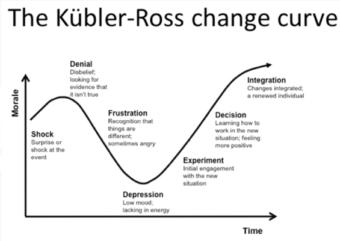
16 Apr Managing change when change is all there is
Welcome to Onswitch’s latest blog, this time looking at the psychology behind how each of us deals with unexpected, but necessary change
During this lockdown period, we’ll be sharing regular updates that we hope will help your business stay on track during these difficult times. You can also get video updates on our Facebook page, where the team are posting short clips of practical tips, useful information and community welfare advice as and when we think of anything that might help.
Please do let us know if there are subjects you’d like to know more about, and we’ll do our best to oblige – we’re all in this together!
#OneVetTeam
Looking back only a few weeks at how we used to work, it’s fair to say that everything has changed! Of course, the changes we’ve all had to make to our personal and working lives to ‘stay home, stay safe and protect the NHS’ are absolutely necessary. That doesn’t make them any easier to cope with though, and not everybody will cope in the same way, or react at the same time. People on your team will be dealing with this ever-changing situation in different ways on different days and it can feel like life is pretty unpredictable and scary.
Understanding the stages of dealing with change
Back in the 60s, psychiatrist Elisabeth Kübler-Ross developed a seven-stage model for grief that can equally be used to explain how we respond to any unexpected change (such as a global pandemic, for example!) The model depicts how following the initial shock of the event, mood remains fairly constant as the person experiences denial of the new situation. Frustration then leads to depression, low mood, lack of energy and an inability to see how things will change and improve. At this point we can get stuck in a ‘doom loop’, seeing only the negatives and feeling sorry for ourselves.

Eventually we begin to try out new ways of working, different approaches to the new normal (although the time it takes for your colleagues to get out of the negative loop will vary from person to person). We then begin to make decisions that acknowledge current situations and integrate positive changes into our working life, ultimately ending the curve with higher morale than when the shock of the change first hit. Hard as it may be to see now, there are positives to our current situation that we’ll grow and improve from over time.
Acceptance as a coping strategy
Obviously it’s not all jolly models and positivity – the sad truth is that many businesses will struggle in the coming weeks and months, and not all will come out the other end. Accepting that things have changed and embracing the need for a flexible approach as a way of adapting will be essential if we are to get through. Don’t put yourself under the added pressure of chasing targets and aiming to hit KPIs during these abnormal times.
In all honesty, 2020 will be a financial write-off.
Accepting this fact can be very liberating, freeing you up to look after your team and keep things ticking over as best you can.
Take this time to re-connect with your team, using the change model to help guide your understanding of where everyone is on the curve. People will be at different stages and will move from one step to another at different rates, so be patient and empathic. Some will have a more heightened awareness of unfamiliarity, and a deeper sensitivity to the practical implications it brings. Encourage everyone to keep talking and sharing as you navigate the changes together – it’s not easy and it’s not where we’d choose to be, but together we will get through it.

Sorry, the comment form is closed at this time.